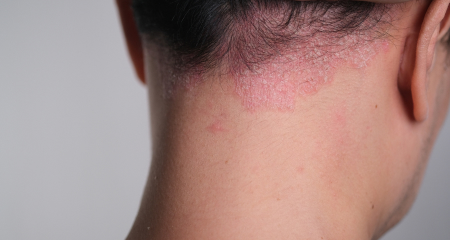
Psoriasis is more than just a skin concern; it’s a battle that deeply affects one’s confidence and overall well-being. With patches that itch, hurt, and impact daily life, a comprehensive approach to management becomes vital. For those in search of such extensive care, Northstar Dermatology in Southlake, Texas, stands as a beacon. Our board-certified dermatologists, backed by years of expertise and a deep sense of empathy, offer tailored solutions to address individual psoriasis concerns. Regain your confidence; get in touch online or phone in to set an appointment.
Psoriasis is an inflammatory condition characterized by rapid skin cell turnover, resulting in thick, red, scaly plaques. The immune system sends abnormal signals, or “cytokines,” that drive this excessive skin cell production. While the exact causes of psoriasis are still under study, it’s understood to be influenced by a mix of genetic factors and environmental triggers, including infections and certain medications. Psoriasis can occur at any age and affects about 1-2% of the population. It is important to note that psoriasis is not contagious.
Psoriasis can manifest in various patterns, from widespread redness to small, pus-filled bumps on the hands and feet. Approximately 20-30% of patients may also develop psoriatic arthritis. Additionally, psoriasis can affect the nails, sometimes leading to changes often mistaken for toenail fungus.
Plaque Psoriasis (Psoriasis Vulgaris): The most common form, plaque psoriasis typically appears on the scalp, elbows, knees, and gluteal cleft (upper buttocks). These plaques may or may not itch and, in severe cases, can crack and bleed.
Inverse Psoriasis: This pattern affects skin folds, such as the armpits, belly button, groin, and under the breasts. Plaques in these areas are usually less thick and often lack the characteristic scaling due to the moist environment.
Guttate Psoriasis: Characterized by small, drop-like spots across the body, guttate psoriasis often appears after a streptococcal infection.
Palmar-Plantar Psoriasis: This form involves the palms and soles, where plaques can fissure, causing significant pain and discomfort.
Pustular Psoriasis: A rare form marked by small pustules that may be accompanied by fever. Triggers include infections, medications, pregnancy, or rapid steroid tapering. Pustular psoriasis variants include widespread forms (e.g., von Zumbusch) or localized forms like palmoplantar pustular psoriasis.
Erythrodermic Psoriasis: This severe form involves extensive skin coverage, which can lead to dangerous fluid loss and heart complications, making it a potential medical emergency.
The following do not necessary cause psoriasis but may trigger flares in individuals who have the condition or are otherwise genetically predisposed:
Treatment for psoriasis depends on various factors, including the severity of the condition and the patient’s overall health, immune status, history of malignancy, and concurrent medications. At Northstar Dermatology, we believe that a comprehensive history and physical exam are essential for determining the most appropriate treatment plan.
Fortunately, a variety of effective treatments are available, with newer and more targeted therapies continually emerging.
Topical Therapy
Topical treatments remain a cornerstone of psoriasis care. Topical corticosteroids, available in varying strengths, act as anti-inflammatory agents. Common options include hydrocortisone, desonide, triamcinolone, mometasone, betamethasone, and clobetasol. Additional topical treatments include calcipotriene (a vitamin D analog), tazarotene (a topical retinoid), and steroid-sparing agents like tacrolimus, pimecrolimus, and roflumilast (Zoryve).
Phototherapy
This treatment involves controlled exposure to specific wavelengths of UV radiation, particularly UVB or narrow-band UVB.
Systemic Medications
For moderate to severe psoriasis that doesn’t respond to topicals alone, oral or injectable medications may be recommended. Oral options include cyclosporine, methotrexate, and Otezla. Injectable treatments, known as biologics, are designed to target specific components of the immune system. Common biologics include infliximab (Remicade), etanercept (Enbrel), adalimumab (Humira), certolizumab (Cimzia), secukinumab (Cosentyx), ixekizumab (Taltz), guselkumab (Tremfya), tildrakizumab (Ilumya), risankizumab (Skyrizi), and ustekinumab (Stelara). These medications are generally safe but require lab monitoring and regular follow-ups due to their effects on the immune system.
For a personalized treatment plan, please contact us or schedule an appointment online today.
